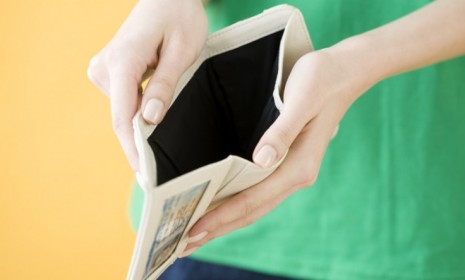6 reasons to love — or hate — our coming cashless future
A new book gleefully predicts that paper money is heading for history's dustbin. But not everyone is excited about abandoning their soiled green bills

A free daily email with the biggest news stories of the day – and the best features from TheWeek.com
You are now subscribed
Your newsletter sign-up was successful
Cash is suffering from "death by a thousand cuts," says Wired editor David Wolman, whose newly released book, The End of Money, predicts the demise of cash. The world's financial transactions are increasingly being conducted electronically, and it's only a matter of time before we will no longer have to pay for stuff with "dirty green paper," he tells Salon. Wolman's book has people thinking about — and in some cases fearing — the prospect of a cashless society. Here, a look at why you should love or hate the cashless revolution:
WHY WE SHOULD WELCOME A CASHLESS FUTURE
1. Cash is inefficient
The Week
Escape your echo chamber. Get the facts behind the news, plus analysis from multiple perspectives.

Sign up for The Week's Free Newsletters
From our morning news briefing to a weekly Good News Newsletter, get the best of The Week delivered directly to your inbox.
From our morning news briefing to a weekly Good News Newsletter, get the best of The Week delivered directly to your inbox.
Imagine a poor worker in an Indian slum who takes the bus to the countryside so he can hand his relatives money, Wolman tells MIT's Technology Review. Why not just give him a cell phone that can move money electronically? It's much, much easier. And the developed world sees benefits, too, Wolman tells Salon. Just look at PayPal, a "gazillion dollar company." It's part of a "great flowering of payment options" that consumers are taking advantage of because it's so much easier than paying with cash.
2. Cash crushes the poor
"Electronic money is faster, it's cheaper, and it's safer," Wolman tells Technology Review. But the poor are still "stuck with cash," which prevents them from climbing out of poverty. Cash is vulnerable to theft, accidents, and any number of mishaps — all of which prevents the poor from building "security against financial shocks, which, when you are teetering on the edge of poverty, can be anything from a broken-down moped to a sprained ankle."
3. Cash facilitates crime
A free daily email with the biggest news stories of the day – and the best features from TheWeek.com
Wolman argues that robberies would dramatically decrease if people didn't have cash on them. Organized crime would be squeezed as well, since cash allows gangsters to do business without being tracked by the police. And the "key crimes associated with cash is tax evasion," says Katy Waldman at Slate. About 80 percent of the U.S.'s $500 billion in missing tax revenue is "attributable to unreported cash."
WHY WE SHOULD FIGHT A CASHLESS FUTURE
1. Corporate power will increase
If we allow all our commercial exchanges to digitally run through banks and other financial entities, we will "put big corporations even more in the center of our lives," says David Sirota at Salon. Cash allows people to avoid "having our financial transactions skimmed off the top by credit card companies." There are privacy issues, too, since electronic transactions will enable companies to scrutinize all our transactions.
2. People will spend money they don't have
Cash is the best way to keep your spending in check, says Michelle Singletary at The Washington Post. "Studies show that using plastic influences people to overspend." If you go to a store with $100 in cash, "you can only spend up to that amount. Cash is a stopgap."
3. Cash is more than just money
"I like cash," says Jennifer Vega at PopMatters, and not just for practical reasons. Cash is "sweet" and "simple." It's nostalgic. It gives us that "wry smile you twist out when you find a crumpled ten dollar bill in a Christmas card from your uncle, who has clearly not kept up with inflation rates, or indeed, your current age." You won't get that jolt of good feeling from electronic money.
Sources: PopMatters, Salon, Slate, Technology Review, The Washington Post


